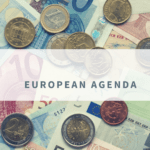At the outset of Eurogroup meeting, members of the Eurogroup offered condolences to Austrian and French colleagues on the recent horrific attacks and reiterated that Europe will always stand together.
The Eurogroup had a thorough discussion on the economic outlook in view of current COVID-19 developments. The Eurogroup was briefed by the Director of the European Centre for Disease Control (ECDC), Dr. Andrea Ammon, on the ECDC’s analysis of the pandemic. The Chair of the European Parliament’s Committee on Economic and Monetary Affairs, Irene Tinagli, also participated in the discussion.
The recent acceleration in the spread of the COVID-19 virus and the new containment measures have further increased uncertainty and are likely to weigh on the recovery. The Eurogroup is closely following health developments and monitoring the economic impacts and prospects. We will continue to coordinate and vigorously implement, at all levels, ambitious economic policies that complement the health response, protect jobs and bring forward the economic recovery, right across the continent.
We took stock of the measures adopted so far and concurred that Europe has reacted forcefully to the pandemic. Coordinated responses have cushioned the economic impact of containment measures on citizens and companies. With the second wave of COVID-19 unfurling, Europe is now better equipped to weather the economic fallout. Back in April, the Eurogroup, together with non-euro area Members, had reached an agreement on three safety nets to be implemented by the European Commission, the European Investment Bank and the European Stability Mechanism for an overall amount of €540 billion. These are now in place, bolstering Member States’ crisis responses, providing much needed support to citizens and companies to help weather the crisis, and providing an additional line of defence for sovereigns.
These safety nets at the European level complement the unprecedented levels of fiscal support put in place by national governments. The fiscal measures implemented at the national level in 2020 amount to 4% of GDP. These measures are in addition to liquidity support initiatives and the operation of automatic stabilisers. These fiscal supports have been enabled by the temporarily allowed departure from the budgetary requirements that would normally apply and the temporary State aid framework. The Eurogroup considers it vital that fiscal support in each Member State continues into 2021, given the heightened risk of a delayed recovery, and adjusts to the situation as it evolves.
Moreover, the European Council agreed in July upon the Next Generation EU plan to support the regions and sectors most impacted by the COVID-19 crisis with a €750 billion fund. This sits at the heart of the EU recovery strategy and represents a unique opportunity for reforms and investment needed at the Member State level, including those that support the green and digital transitions.
We are committed to continue working together to facilitate the Next Generation EU plan and, in particular, the Recovery and Resilience Facility. These are to be agreed and implemented as a matter of priority, allowing for a swift disbursement of funds in 2021. This is needed to support appropriate reforms and investments and thereby sustain an inclusive recovery. We are confident that the Council and Parliament will reach an agreement before the end of 2020.






Leave a Reply